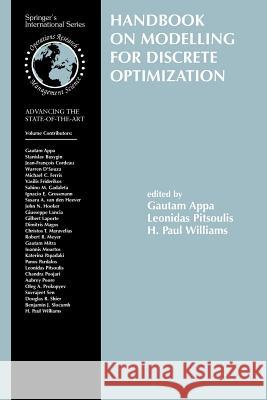Handbook on Modelling for Discrete Optimization » książka
Handbook on Modelling for Discrete Optimization
ISBN-13: 9781441941077 / Angielski / Miękka / 2010 / 434 str.
The primary reason for producing this book is to demonstrate and commu- nicate the pervasive nature of Discrete Optimisation. It has applications across a very wide range of activities. Many of the applications are only known to specialists. Our aim is to rectify this. It has long been recognized that ''modelling" is as important, if not more important, a mathematical activity as designing algorithms for solving these discrete optimisation problems. Nevertheless solving the resultant models is also often far from straightforward. Although in recent years it has become viable to solve many large scale discrete optimisation problems some problems remain a challenge, even as advances in mathematical methods, hardware and software technology are constantly pushing the frontiers forward. The subject brings together diverse areas of academic activity as well as di- verse areas of applications. To date the driving force has been Operational Re- search and Integer Programming as the major extention of the well-developed subject of Linear Programming. However, the subject also brings results in Computer Science, Graph Theory, Logic and Combinatorics, all of which are reflected in this book. We have divided the chapters in this book into two parts, one dealing with general methods in the modelling of discrete optimisation problems and one with specific applications. The first chapter of this volume, written by Paul Williams, can be regarded as a basic introduction of how to model discrete optimisation problems as Mixed Integer Programmes, and outlines the main methods of solving them.











